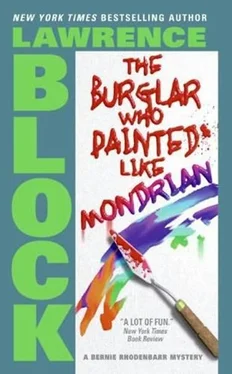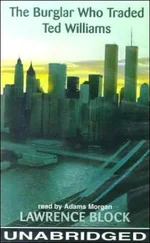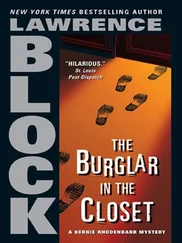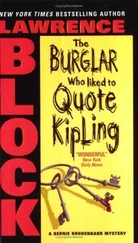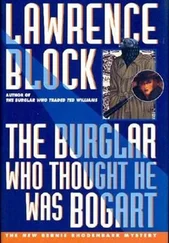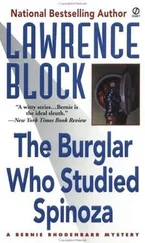He got to his feet, and Ray Kirschmann stood up immediately. Francis Rockland was already standing; he’d moved to within arm’s reach of Jacobi.
“You can’t prove any of this,” Jacobi said.
“Your room was searched,” Ray told him pleasantly. “You got enough city-owned books in there to start a branch library.”
“So? That’s petty theft.”
“It’s about eight hundred counts of petty theft. Tack all those short sentences together, you got yourself a pretty good-sized paragraph.”
“Kleptomania,” Jacobi said. “I have a compulsion to steal library books. It’s harmless, and I eventually return them. It hardly qualifies me as a murderer.”
“There were some pictures in there too,” Ray said. “Fakes, I suppose, but you couldn’t prove it by me. Mr. Lewes here’s the expert, but all I can tell is they’re paintin’s without frames, and what do you bet they turn out to be the work of your buddy Turnquist?”
“He gave them to me. They were a gift of friendship, and I’d like to see you prove otherwise.”
“We got a guy goin’ door-to-door at your roomin’ house, and what do you bet we turn up somebody who saw you carryin’ those canvases from his room to yours? And that woulda been after he was killed an’ before the body was discovered, and let’s hear you explain that one away. Plus we got a note in his room, Turnquist’s room, with Bernie’s name and address, same as the note we found on the body. You want to bet they turn out to be your handwritin’ and not his?”
“What does that prove? So I wrote down a name and address for him.”
“You also phoned in a tip. You said if we wanted to know who killed Turnquist we should ask Bernie Rhodenbarr.”
“Maybe somebody called you. It wasn’t me.”
“Suppose I told you that all incomin’ calls are recorded? And suppose I told you that voiceprint identification is as good as fingerprints?”
Jacobi was silent.
“We found somethin’ else in your room,” Ray said. “Show him, Francis.”
Rockland reached into a pocket and produced an icepick. Richard Jacobi stared at it-hell, so did everybody else in the room-and I thought he was going to fall over in a faint. “You planted that,” he said.
“Suppose I told you there were blood traces on it? And suppose I told you the blood type’s the same as Turnquist’s?”
“I must have left it in the bookshop,” Jacobi blurted. “But that’s impossible. I threw it in a Dempsey dumpster. Unless I’m wrong and I dropped it in the store, but no, no, I remember I had it in my hand on the way out.”
“So you could stab me if I challenged you,” I put in.
“You never even knew I was there. And you didn’t follow me. Nobody followed me. Nobody even knew I left, and I went around the corner with the icepick hidden under my jacket and I went up Broadway and dumped it in the first dumpster I came to, and you couldn’t possibly have gotten it out of there.” He drew himself triumphantly to his full height. “So it’s a bluff,” he told Ray. “If there’s any blood on that thing it’s not Eddie’s. Somebody planted that icepick and it wasn’t the murder weapon in the first place.”
“I guess it was just another icepick that happened to be in your room,” Ray said. “But now that you’ve told us where to look for the other one, I don’t think we’ll have a whole lot of trouble finding it. Should be easier than a needle in a haystack, anyway. What else do you want to tell us?”
“I don’t have to tell you anything,” Jacobi said.
“Now you’re absolutely right about that,” Ray said. “As a matter of fact, you have the right to remain silent, and you have the right to-”
Di dah di dah di dah.
After Rockland had led him away, Ray Kirschmann said, “Now we come to the best part.” He went into the kitchen and returned with my five-foot cylindrical tube, uncapped it and drew out a rolled canvas. He unrolled it, and damned if it didn’t look familiar.
Barnett Reeves asked what it was.
“A paintin’,” Ray told him. “Another of the Moondrains, except it’s a fake. Turnquist painted it for Barlow and Barlow sold it to Onderdonk and stole it back after he killed him. It’s a perfect match for the broken frame and bits of canvas we found with Onderdonk’s body in the bedroom closet.”
“I can’t believe it,” Mrs. Barlow said. “Do you mean to say my husband carried that thing off and didn’t have the brains to destroy it?”
“He probably didn’t have the opportunity, ma’am. What was he gonna do, drop it down the incinerator? Suppose it was recovered? He put it where he thought it would be safe and intended to destroy it at leisure. But acting on my own initiative I discovered it through the use of established police investigative techniques.”
Oh, God.
“Anyway,” he went on, presenting it to Orville Widener, “here it is.”
Widener looked as though his dog had just brought home carrion. “What’s this?” he said. “Why are you giving it to me?”
“I just told you what it is,” Ray said, “and I’m givin’ it to you on account of the reward.”
“What reward?”
“The thirty-five grand reward your company’s gonna shell out for the paintin’ they insured. I’m handin’ you the paintin’ in front of witnesses and I’m claimin’ the reward.”
“You must be out of your mind,” Widener snapped. “You think we’re going to pay that kind of money for a worthless fraud?”
“It’s a fraud, okay, but it’s a long ways from worthless. You can pay me the thirty-five grand and say thank you while you do it, because otherwise you’d be ponyin’ up ten times as much to the cousin in Calgary.”
“That’s nonsense,” Widener said. “We don’t have to pay anything to anybody. The painting’s a fake.”
“Doesn’t matter,” Wally Hemphill said, one hand on his wounded knee. “Onderdonk paid the premiums and you people took them. The fact that it was a fake and was overinsured doesn’t alter your responsibility. The insured acted in good faith-he certainly believed it to be authentic and he had paid a price for it commensurate with the coverage he took out on it. You have to restore the insured painting to my client in Calgary or else reimburse him for a loss in the amount of $350,000.”
“I’ll see what our own legal people have to say about that.”
“They’ll say just what I just got through telling you,” Wally said, “and I don’t know what you’re in a huff about. You’re getting off cheap. If it weren’t for Detective Kirschmann here, you’d pay the full insured value.”
“Then Detective Kirschmann’s costing your client money, isn’t he, counselor?”
“I don’t think so,” Wally said, “because we need the fake in order to substantiate our suit against Barlow. Barlow’s got money, and he got some of it from my client’s deceased uncle, and I intend to bring suit to recover the price paid for the spurious Mondrian. And I’m also representing Detective Kirschmann, so don’t think you can weasel out of paying him his reward.”
“We’re a reputable company. I resent your use of the word ‘weasel.’”
“Oh, please,” Wally said. “You people invented the word.”
Barnett Reeves cleared his throat. “I have a question,” he said. “What about the real painting?”
“Huh?” somebody said. Probably several people, actually.
“The real painting,” Reeves said, pointing to the canvas that Lloyd Lewes had authenticated several revelations ago. “If there’s no objection, I should like to take that back to the Hewlett Gallery, where it belongs.”
“Now wait a minute,” Widener said. “If my people are coming up with $35,000-”
Читать дальше
